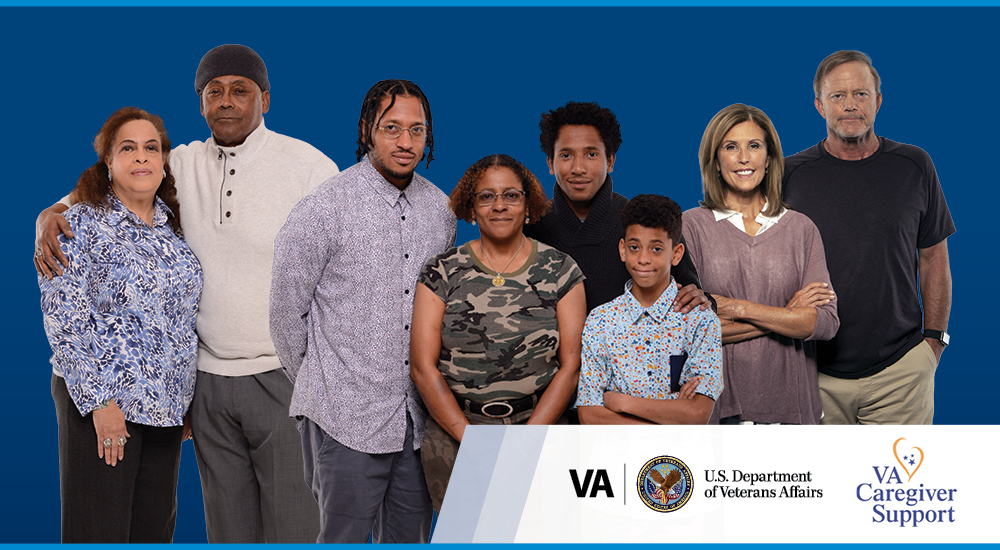VA recently released its “VA Suicide Prevention Toolkit for Caregivers,” a comprehensive guide aimed at providing caregivers with resources to help them care for not only Veterans, but also themselves.
More than 2.4 million people devote a significant part of their lives to taking care of Veterans. From household chores to doctor’s appointments, caregivers tackle a seemingly endless list of tasks to care for the Veteran in their life. With the number of roles and responsibilities caregivers take on, it can be difficult to care for one’s own well-being. Knowing how and when to seek support can be challenging, and life events, careers, families, and other stressors can distract caregivers from seeking care. It’s imperative to know how to easily find and access resources that may help.
All caregivers should visit VA’s Caregiver Support Program (CSP) website which offers tips, tools, and other information for those that care for Veterans. The site includes online courses, in-person classes, telephone support, and peer support, among other support features.
VA has many resources to help caregivers of Veterans – of all eras – improve their health and well-being:
- VA’s Caregiver Support Line is staffed by caring licensed professionals who can connect you with VA services or a Caregiver Support Coordinator at your nearest VA medical center — or just listen if that’s what you need. Call 1-855-260-3274.
- Resources for Enhancing All Caregivers’ Health (REACH) Intervention is an evidence-based intervention that helps caregivers of Veterans with dementia, spinal cord injuries, multiple sclerosis, and other serious ailments.
- Building Better Caregivers (BBC) is a six-week online workshop for caregivers who are caring for someone with dementia, memory problems, posttraumatic stress disorder, serious brain injury, or any other serious injury or illness.
- Finally, VA’s CSP Peer Support Mentoring (PSM) Program enables caregivers to receive guidance from VA-trained peers and to share their experiences, wisdom, skills, and passion with other caregivers.
The Program of Comprehensive Assistance for Family Caregivers (PCAFC) supports caregivers of Veterans who experienced or aggravated a serious injury in the line of duty on or after September 11, 2001. This program provides enhanced services for caregivers, including a monthly stipend, the Civilian Health and Medical Program of VA (CHAMPVA), counseling and mental health services, respite care, and certain travel benefits. VA will expand eligibility for the PCAFC to caregivers of all eras as the MISSION Act is fully implemented.
In addition, the Caregiver Support Program offers a budget sheet and, along with the USAA Educational Foundation, has developed a series of videos on financial resources and other relevant topics to help balance a budget and maintain financial stability.
These are just some of the resources available. The guide includes more detail on programs available not only from VA, but also from our partners. If you are a caregiver of a Veteran, we are incredibly grateful for the work you do each day to support your Veteran. You are the first line in defense and typically are first to detect areas where your Veteran needs added care.
You are not alone. VA cares about caregiver health and wellness and is here to support you in caring for yourself, as you care for your Veteran. If you are a caregiver and need help, please reach out.
If you or someone you know is having thoughts of suicide, contact the Veterans Crisis Line to receive free, confidential support and crisis intervention available 24 hours a day, 7 days a week, 365 days a year. Call 1-800-273-8255 and Press 1, text to 838255 or chat online at VeteransCrisisLine.net/Chat.
Reporters covering this issue can download VA’s Safe Messaging Best Practices fact sheet or visit www.ReportingOnSuicide.org for important guidance on how to communicate about suicide.
Leah Christensen is a Clinical Program Coordinator for VA’s Caregiver Support Program and Aimee Johnson is a Program Analyst for VA’s Office of Mental Health and Suicide Prevention.
Topics in this story
More Stories
Caregiving can be a deeply rewarding journey, but it also can be overwhelming and isolating. That’s why support and connection can make all the difference.
The slopes of the Winter Sports Clinic help Veterans with disabilities remember that pushing boundaries—and not their limitations—is what defines them.
One unbreakable bond shows that "even little things can change people’s lives.”






Too late for this family.Hope toolkit saves another caregiver the devastating effects of lack of mental health care&resources from the VA.I suggest training all VAstaff when a caregiver is crying for help for their suicidal veteran, the response shouldn’t be “we are here for the soldier-not the family”
That is awesome, BTW I also have question like the above one, is Is there a way to bring the toolkit to West Virginia? I have a caregiver.
Is there a way to bring the toolkit to West Virginia? I have a caregiver.